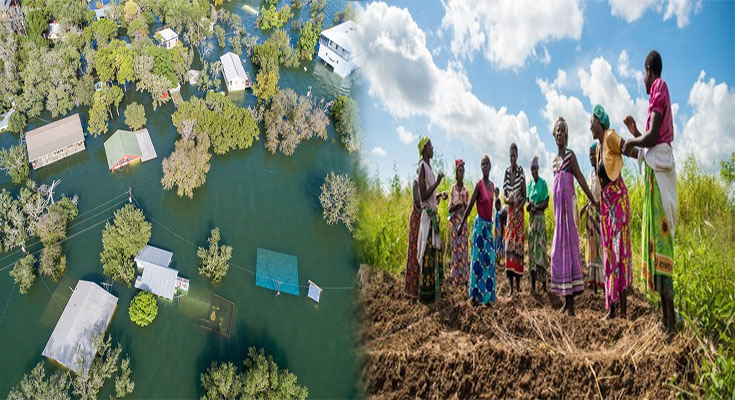The new entity that has recently been established under the Global Climate Action Summit (GCAS) umbrella is the Insurance Innovation Lab for Climate Resilience (InnoCRI), a $29 million insurance-based financing mechanism launched by GCAS to help finance climate change resilience in developing countries. At the time of the launch, we knew that InnoCRI would be a key part of GCAS and its goal of creating an “insurance-based financing mechanism” to support resilience to climate change in developing countries. We also knew that the program will have an impact on private insurance market by providing technical assistance and training for insurers, reinsurers and other financial institutions to understand risks associated with climate change as well as how insurance can be used as tool for mitigating these risks.
A few weeks ago, I wrote about the new entity that has recently been established under the Global Climate Action Summit (GCAS) umbrella.
- A few weeks ago, I wrote about the new entity that has recently been established under the Global Climate Action Summit (GCAS) umbrella.
- InnoCRI will be funded by GCAS and will provide seed funding to innovators working on climate change resilience insurance products in developing countries.
The Insurance Innovation Lab for Climate Resilience (InnoCRI), is a $29 million insurance-based financing mechanism launched by GCAS to help finance climate change resilience in developing countries.
You may be aware that the Global Climate Action Summit (GCAS) is an international summit on climate change that takes place every two years. The GCAS aims to accelerate and expand efforts to address climate change, with a focus on cities, states and regions.
InnoCRI is part of GCAS and was launched in 2019 as a $29 million insurance-based financing mechanism to help finance climate change resilience in developing countries. It has been developed in collaboration with the World Bank Group’s International Finance Corporation (IFC), who will manage implementation; Swiss Re; Willis Towers Watson; Marsh & McLennan Companies Incorporated; Lloyd’s Market Association Ltd.; Aon plc., Swiss Re Corporate Solutions AG & Co KGaA
At the time of the launch, we knew that InnoCRI would be a key part of GCAS and its goal of creating an “insurance-based financing mechanism” to support resilience to climate change in developing countries.
At the time of the launch, we knew that InnoCRI would be a key part of GCAS and its goal of creating an “insurance-based financing mechanism” to support resilience to climate change in developing countries.
InnoCRI is an innovative approach to providing insurance against weather-related disasters that can be implemented at scale across many countries and regions. It uses data from satellites and other sources to create probabilistic assessments of the likelihood of different types of extreme events occurring in different locations over time. Based on these probabilities, insurers offer payouts if particular thresholds are exceeded–for example, if there’s more than a 90% chance that flooding will occur somewhere within five years’ time (and therefore cause damage) then you could receive up to $50 per person per year for 10 years until 2100 as compensation for losses incurred due to flooding during those periods when high risk was detected by this method.[1]
We also knew that the program will have an impact on the private insurance market by providing technical assistance and training for insurers, reinsurers, and other financial institutions to understand risks associated with climate change, as well as how insurance can be used as a tool for mitigating these risks.
We also knew that the program will have an impact on the private insurance market by providing technical assistance and training for insurers, reinsurers, and other financial institutions to understand risks associated with climate change, as well as how insurance can be used as a tool for mitigating these risks.
The goal is to help insurers become more resilient against extreme weather events in order to minimize their losses from natural disasters such as hurricanes or floods.
By exchanging information about new technologies or best practices that are being implemented across various industries (e.g., agriculture), we can share experiences with each other so we can learn from one another’s mistakes and successes
This blog post provides more information about what this new initiative hopes to achieve and how it plans on doing so
Climate change resilience insurance is a new initiative that aims to help communities adapt to the effects of climate change. The initiative will do this by providing insurance for natural disasters, including floods and droughts. The key features of the program include:
- A focus on local rather than national governments;
- An emphasis on partnerships with nongovernmental organizations (NGOs) and private companies;
- An open-source model that allows anyone in any country or region to use its tools and resources regardless of location;
Climate Change Resilience Insurance hopes that by working with NGOs such as Oxfam International, they can achieve their goal of making sure everyone has access to insurance against natural disasters so they can continue their lives without worrying about whether they’ll have food on their tables or roofs over their heads after a disaster strikes
I think that InnoCRI is a great initiative and I’m excited to see where it goes in the future. I think that it has the potential to help millions of people around the world who are affected by climate change but don’t have access to traditional insurance coverage.





